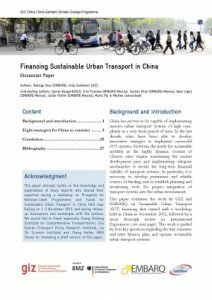Over the last decade, China has experienced explosive urban development, rapid motorisation and a fast growing demand for urban mass transport systems. To further develop new and to maintain existing systems, permanent and reliable sources of funding for both construction and operation are crucial. A new GIZ paper discusses regulatory, financial and institutional challenges and possible ways forward for financing sustainable urban transport systems in China. Authors of the paper identified the following eight strategies for overcoming the funding gap and channeling more of the existing resources into sustainable developments:
- Institutional reform: Unifying all responsibilities for SUT
- Establishing a Chinese national or provincial sustainable low-carbon urban transport fund
- Strengthening local debt management
- Creating new forms of revenues for SUT policies at the local level
- Promoting public-private-partnerships
- Integrating policy guidance under a single comprehensive framework for SUT
- Developing urban mobility plans linked to urban development plans
- Setting up capacity building programmes
To extend and sustain sustainable urban transport systems in Chinese cities it will be crucial, to find a balance between coherent national-level policy guidance and funding support on the one hand and giving more decision-making as well as fiscal power to local governments on the other.
Download the PDF and continue reading the whole discussion paper here:
Further information on the topic:
GIZ’s International Review of National Urban Transport Policies and Programmes.
GIZ’s Final Workshop Summary Report on Financing Sustainable Urban Transport.



